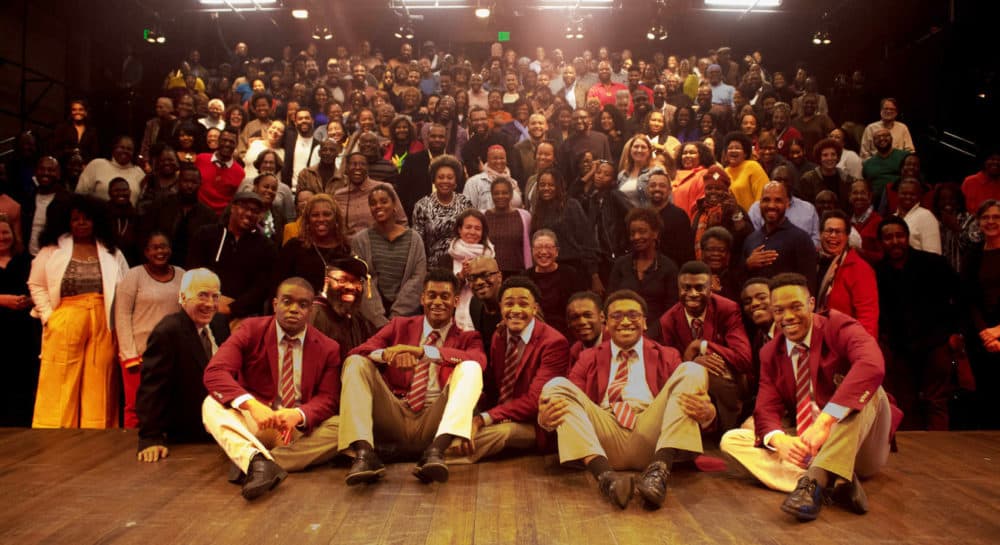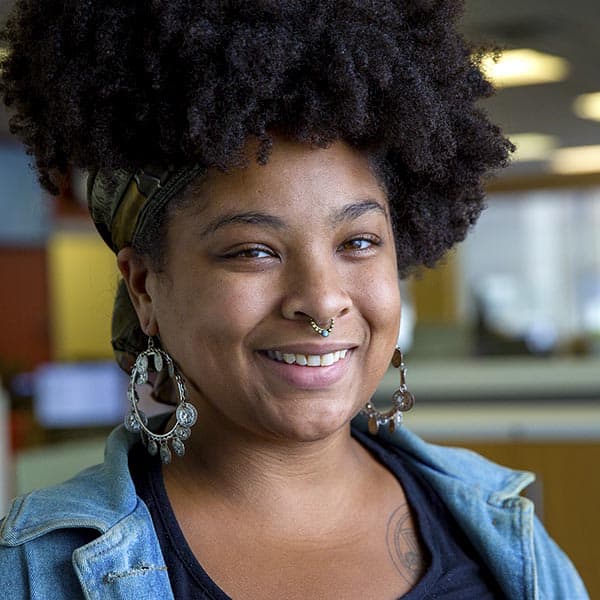Advertisement
Commentary
For Once, I Experienced Theater With A Lot Of Other Black People In Boston

The warm, inviting sound of conversation reached me before I even made it to the front doors of the Calderwood Pavilion to see SpeakEasy Stage's production of "Choir Boy." Once inside, I was stopped in my tracks by an unfamiliar sight. The lobby and ticket lines were bustling, as they usually do when a Tony Award-nominated play is on stage. But for all the times I've been here, I've never seen so many people of color gathered to see a show.
Dubbed #BlackOutBoston, this particular showing of "Choir Boy" earlier this month was a concerted effort between SpeakEasy Stage Company and The Front Porch Arts Collective, a theater company by, and for, people of color.
Front Porch, who helmed #BlackOutBoston, was inspired by the same initiative for Jeremy O. Harris’ "Slave Play" — 800 seats at the Golden Theatre in New York City were filled by Black theatergoers for the Sept. 18 performance. In this spirit, the #BlackOutBoston effort sought to ensure that the audience reflected not only the actors on stage, but the deep, cultural specificity written into the flesh of "Choir Boy."
"Choir Boy" was penned by Tarell Alvin McCraney, whose script "In Moonlight, Black Boys Look Blue" was the basis for the award-winning film, "Moonlight." Like much of McCraney's previous work, "Choir Boy" centers the realities of Black men with a focus on queer Black men. The play takes place within the walls of a historically Black, all boys boarding school and explores the complexities of sexuality and identity. Much of the production is steeped in Black culture, explicitly referencing America's anti-Black history, old spirituals and gospel in the Black church and the practice of "stepping," a dance form specific to the fraternities at historically Black colleges and universities.
It was important to "Choir Boy" director and Front Porch co-founder, Maurice Emmanuel Parent, as a Black man deeply invested in the theater world, to intentionally invite Boston's Black population into the Calderwood Pavilion. "Our goal was to offer Black audiences the chance to experience what their white counterparts enjoy on a regular basis, and that is the chance to be the majority in a theater audience,” he said.
Statistics released last year from The Broadway League show that three fourths of all tickets bought for Broadway shows were purchased by white theatergoers. These numbers don't mean that people of color don't like theater or don't want to attend theater shows. What it means is that the world of theater exists in a web of racist and classist systems that keep people of color from accessing historic, institutional theater spaces.
James Hatch, the co-author of "A History of African American Theatre," points out that a history of segregated theaters and segregated seating have historically kept Black theater lovers from attending shows, along with factors like inaccessible ticket prices. On stage and theater production representation are also lacking in equity. In 2017, the Actor's Equity Association reported that white people make up the majority of all onstage contracts and that people of color receive lower salaries than their white counterparts.
Advertisement
Racial disparity in the theater world led many marginalized groups to open and operate their own theater groups and secure their own spaces for productions. In Roxbury, there's Hibernian Hall, which serves as a home for many musical, theatrical and dance productions. “There's a long legacy of Black theater in Boston that hasn’t been highlighted in the way it should be," says Parent. "With #BlackOutBoston, we wanted to make it clear that when you make space for Black people, we show up."
#BlackOutBoston could've turned out badly, soured by poor or inauthentic execution that rendered it a gimmick to capitalize on Black dollars. It's honestly what I was expecting when I arrived. Institutions have a habit of utilizing "diverse" programming to slap a band-aid on deep rooted racial inequities.
But I was stunned by the energy in the theater that night, taken in by the warmth with which attendees sparked conversation and greeted each other. Many knew others already and many more met new people in the process. As we sat in our seats, the theater was buzzing with conversation, with people introducing themselves to one another, cracking jokes about "CPT." It felt like a jubilant, family reunion.
The authentic feeling of the night was, in part, due to the collaboration between Front Porch and SpeakEasy. "SpeakEasy took a conscious step back so that we could lead this initiative," Parent said. Other steps were taken to lower barriers to access, including a two-tiered ticket system for the night and outreach to leaders and organizations working in Black communities across the greater Boston area.
The effort worked. That night, "Choir Boy" was completely sold out and the best part of it all was that it felt real. My partner has avoided theater spaces precisely because he feels out of place. But #BlackOutBoston made him feel at ease.
Achieving racial equity in theater certainly won't be solved by one night of Black attendance. But that's not the point of #BlackOutBoston. The point is to make a statement. "We want it to be clear that the presence of a Black audience is not only welcome but vital," Parent said. "We want it to be clear that we belong in the theater, both on stage and in those seats, watching."

